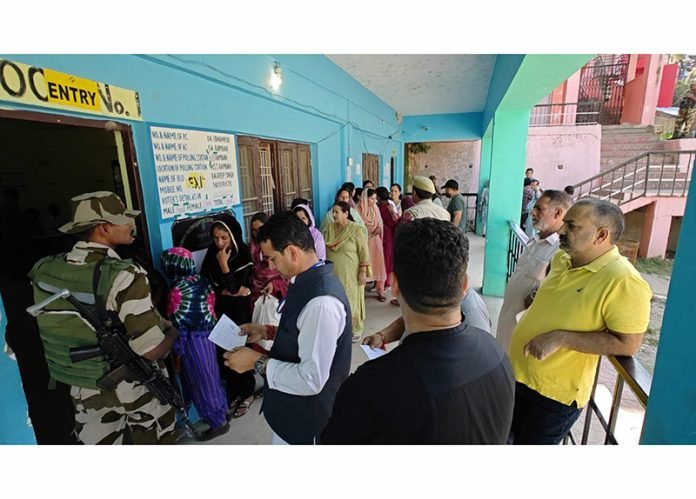As voters lined up at polling stations in the mountainous district of Ramban, the palpable enthusiasm was juxtaposed with the stark realities of daily life. Bad roads and garbage-strewn streets, especially around government schools serving as polling sites, highlighted the pressing issues residents hope the new government will address.
The polling station at Government Model Higher Secondary School Ramban saw a significant turnout as the first phase of the Legislative Assembly elections began. Voters expressed a mix of hope and urgency, driven by the desire for improved infrastructure, particularly water supply and road conditions.
Local Concerns and Aspirations
Among those casting their votes was Rukhsana Begum, a 24-year-old housewife from the Ashri area. Accompanied by her husband and mother-in-law, she voiced her hopes for better roads. “I voted for a candidate who can prioritize our issues,” she said, adding that ration shortages at government depots had left many families struggling for the past six months.
Naseema Begum, 25, from the Seri area, echoed similar concerns about road conditions and flooding in her neighborhood. Meanwhile, first-time voter Kanika, a 22-year-old pursuing a PG degree in Political Science, expressed her desire for the restoration of statehood and development in her district.
The Youth’s Responsibility
For many young voters like Shreya Sharma, also 22, this election represents a pivotal moment. She articulated a sense of responsibility, highlighting the dilapidated roads and inadequate veterinary services in her area. “We must vote for change,” she emphasized.
Another first-time voter, Arushi Raina, 25, waiting at the Government Middle School Girls’ Polling Station, expressed frustration over ongoing water supply issues in her locality. “In 2024, it’s unacceptable that we still face such basic problems,” she said.
Voices from the Community
The sentiment for change was echoed by Babli Devi, 50, and Shahzan Begum, 39, both from Maitra. They raised concerns about unemployment, rising prices, and the impact of bad roads on pregnant women during emergencies.
Specially-abled voter Mohd Rafiq, 42, made his way to the polls in a wheelchair. After voting, he planted a sapling at the Pink Polling Station, emphasizing the struggles of disabled individuals in Ramban. “Many have faced delays in pension verification, leaving us in dire straits,” he shared.
Jon Mohd, 50, a businessman, expressed his hopes for better governance, stating, “I voted for a candidate who can bring real development to our area.”
Infrastructure Challenges Persist
At another polling station in Boys Middle School, Nanak Chand, 70, a farmer, shared his frustrations about irregular water supply in his locality. “We often wait days for water,” he lamented, but like many others, he remained hopeful for change with the new government.
Conclusion
As Ramban votes in this historic election, the prevailing sentiment is one of hope intertwined with urgency. Residents are looking to their elected representatives to address long-standing issues that affect their daily lives. With the first phase of voting complete, the community eagerly anticipates the outcome, hoping for a regime that prioritizes infrastructure development and better living conditions.



